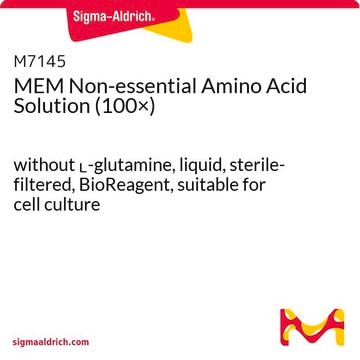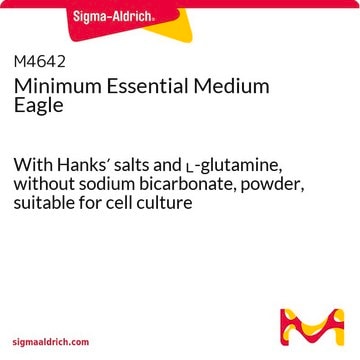M3024
Minimum Essential Medium Eagle
with Earle′s salts and non-essential amino acids, without L-glutamine, phenol red and sodium bicarbonate, Modified, powder, suitable for cell culture
Synonym(s):
EMEM, MEM
About This Item
Recommended Products
Quality Level
form
powder
technique(s)
cell culture | mammalian: suitable
components
Earle’s salts (5% CO2): yes
L-glutamine: no
HEPES: no
NaHCO3: no
sodium pyruvate: no
phenol red: no
shipped in
ambient
storage temp.
2-8°C
Looking for similar products? Visit Product Comparison Guide
General description
Application
- to culture endometrial adenocarcinoma Ishikawa cells for bisphenol studies
- to culture MCF-7 cells for experimental treatments with hormone
- to maintain zebrafish pineal glands for action spectrum analysis
Features and Benefits
Quantity
Reconstitution
also commonly purchased with this product
supplement
Storage Class Code
13 - Non Combustible Solids
WGK
WGK 1
Flash Point(F)
Not applicable
Flash Point(C)
Not applicable
Certificates of Analysis (COA)
Search for Certificates of Analysis (COA) by entering the products Lot/Batch Number. Lot and Batch Numbers can be found on a product’s label following the words ‘Lot’ or ‘Batch’.
Already Own This Product?
Find documentation for the products that you have recently purchased in the Document Library.
Customers Also Viewed
Articles
A large selection of MEM formulations. Minimum Essential Medium (MEM), developed by Harry Eagle, is one of the most widely used of all synthetic cell culture media.
A large selection of MEM formulations. Minimum Essential Medium (MEM), developed by Harry Eagle, is one of the most widely used of all synthetic cell culture media.
A large selection of MEM formulations. Minimum Essential Medium (MEM), developed by Harry Eagle, is one of the most widely used of all synthetic cell culture media.
A large selection of MEM formulations. Minimum Essential Medium (MEM), developed by Harry Eagle, is one of the most widely used of all synthetic cell culture media.
Protocols
Powdered media and salt mixtures are extremely hygroscopic and should be protected from atmospheric moisture.
Our team of scientists has experience in all areas of research including Life Science, Material Science, Chemical Synthesis, Chromatography, Analytical and many others.
Contact Technical Service



